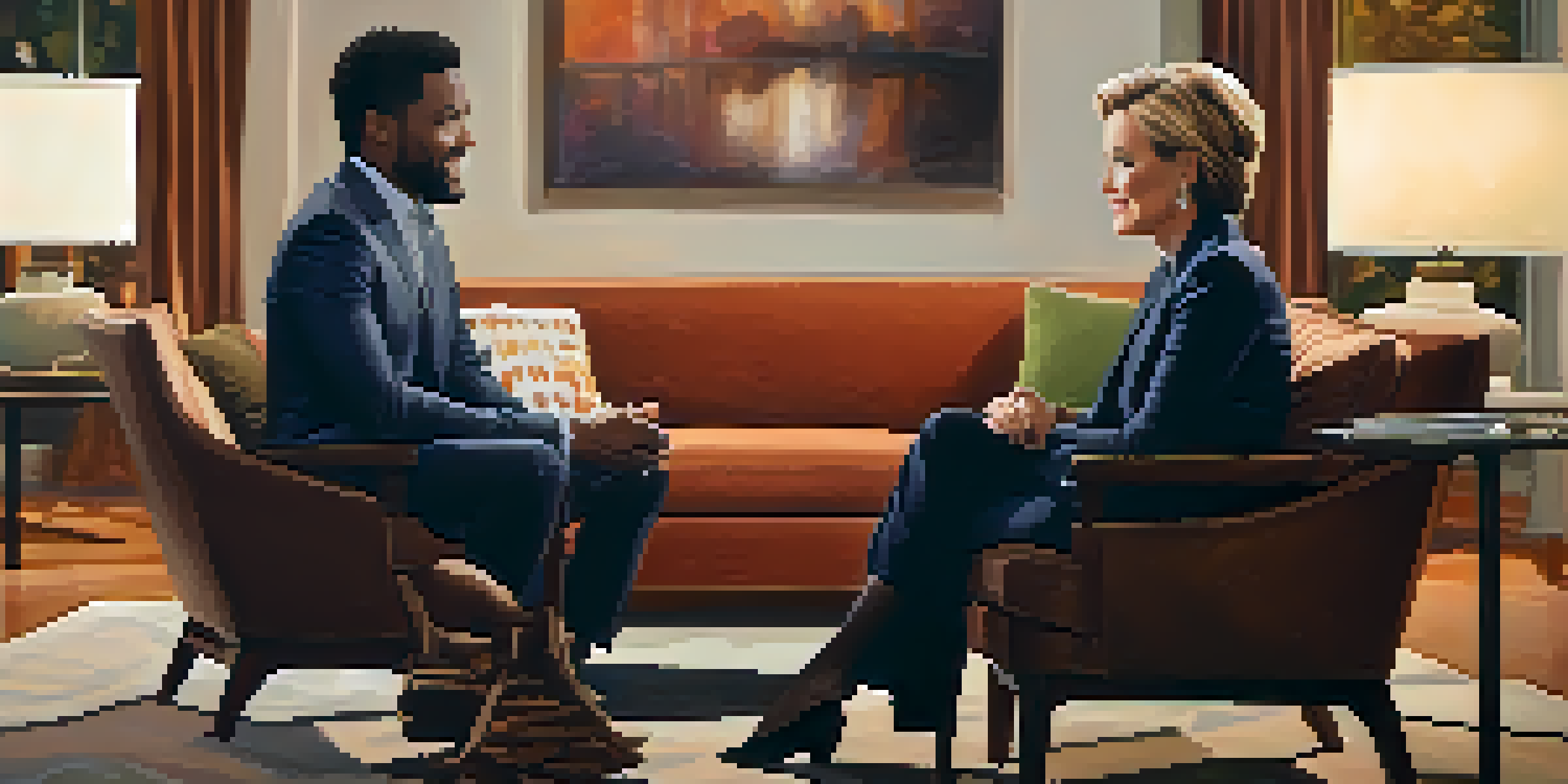The Evolution of Celebrity Interviews in Modern Media

The Early Days: Print and Broadcast Interviews
In the early 20th century, celebrity interviews were primarily conducted through print media and radio. Journalists would have to rely on in-person meetings or phone calls, often resulting in a more formal and structured dialogue. This approach allowed for a controlled narrative, where the celebrity's image was carefully curated by both the interviewer and the subject.
The best way to predict the future is to create it.
Print interviews often focused on the celebrity's latest projects, with an emphasis on their public persona. For instance, movie stars would discuss their latest films in great detail, but personal insights were limited. This created a barrier, making celebrities seem more distant and less relatable to the audience.
As television emerged, the dynamics shifted slightly. With visuals in play, audiences began to connect with celebrities on a more personal level. Programs like 'The Tonight Show' introduced a more relaxed atmosphere, inviting audiences into the private lives of stars, albeit still within a scripted format.
The Rise of Talk Shows and Personal Connections
As the 1970s rolled in, talk shows became a staple of American television, bringing celebrities into living rooms across the country. Hosts like Johnny Carson and Oprah Winfrey created a new format where celebrities could discuss their lives more candidly. This shift allowed viewers to see a softer side of stars, transforming them from untouchable icons to relatable individuals.

The informal setting of talk shows encouraged celebrities to share personal stories, struggles, and triumphs. For example, Winfrey's interviews often included emotional moments where guests would open up about their challenges, fostering a deeper connection with the audience. This made the interviews not just about the celebrity's work, but also about their humanity.
Shift to Casual Celebrity Interviews
The rise of talk shows and podcasts has transformed celebrity interviews into more relaxed and personal conversations.
This era laid the groundwork for future interviews, blending entertainment with authenticity. Fans began to crave this new level of intimacy, leading to an expectation for celebrities to be more open in interviews across all media platforms.
The Internet Age: A Shift in Interview Dynamics
With the rise of the internet in the late 1990s and early 2000s, the landscape of celebrity interviews began to change dramatically. Online platforms allowed for instant access to interviews, enabling fans to engage with their favorite stars in real-time. This shift not only democratized celebrity culture but also increased the demand for more frequent and casual interactions.
Authenticity is the daily practice of letting go of who we think we're supposed to be and embracing who we are.
Social media platforms like Twitter and Facebook became new arenas for celebrities to share their thoughts and experiences. The line between public and private began to blur as stars shared snippets of their daily lives, allowing fans to feel a closer connection. Interviews started to take on a more informal tone, often resembling conversations rather than traditional Q&As.
This evolving dynamic introduced new challenges for celebrities, as they navigated the balance between sharing personal insights and maintaining boundaries. The expectation for transparency grew, and fans began to appreciate authenticity over polished responses.
The Influence of Digital Media and Podcasts
In recent years, podcasts have emerged as a popular medium for celebrity interviews, offering a platform for unfiltered conversations. Unlike traditional media, podcasts allow for longer formats, enabling in-depth discussions that reveal more about the guest's personality. This shift has led to a resurgence of candid storytelling, where celebrities can share their experiences without the constraints of time or format.
Hosts like Joe Rogan and Dax Shepard have gained massive followings thanks to their casual yet insightful interviewing styles. Their ability to create a relaxed environment encourages celebrities to let their guard down, leading to conversations that resonate with listeners. For instance, Shepard's podcast often delves into mental health and vulnerability, topics that were once taboo in celebrity culture.
Social Media's Role in Authenticity
Social media has empowered celebrities to control their narratives, fostering a more authentic connection with fans.
Moreover, the accessibility of podcasts means that fans can engage with these conversations on their own terms, creating a more personal connection. This evolution signifies a move towards deeper, more meaningful interactions that prioritize storytelling over mere promotion.
The Impact of Social Media on Celebrity Interviews
Social media has transformed how interviews are conducted and consumed, allowing for real-time interactions between celebrities and fans. Platforms like Instagram and TikTok have introduced new formats, where stars can share snippets of interviews or engage in informal chats directly with their audience. This immediacy fosters a sense of community, as fans feel more involved in the celebrity's life.
Additionally, social media provides celebrities with control over their narratives. They can choose what to share and how to present themselves, reducing the risk of misinterpretation by traditional media. This shift has led to a more authentic representation of celebrities, as they can showcase their personalities beyond the confines of scripted interviews.
However, this newfound freedom comes with its own set of challenges. Celebrities often face scrutiny over their posts, as every comment or image can lead to public discourse. The pressure to maintain a certain image can sometimes overshadow the genuine connections that social media is designed to create.
The Role of Authenticity in Modern Interviews
In today's media landscape, authenticity has become a key factor in the success of celebrity interviews. Audiences are increasingly drawn to raw, unfiltered conversations that reveal the real person behind the fame. This trend has led many celebrities to prioritize honesty in their interviews, sharing not just their triumphs but also their struggles and vulnerabilities.
For example, many stars now openly discuss mental health issues, personal relationships, and the pressures of fame during interviews. This candidness fosters a deeper connection with fans, as it highlights shared human experiences. It reflects a cultural shift towards valuing transparency and relatability over the polished, idealized versions of celebrities.
Future Trends in Celebrity Interviews
Advancements in technology and a growing preference for authenticity will shape the future of celebrity interviews.
As a result, interviewers are adapting their techniques to create an environment that encourages this level of openness. By asking thoughtful, probing questions, they can elicit genuine responses that resonate with audiences, making interviews feel more like conversations among friends rather than a rigid Q&A session.
The Future of Celebrity Interviews in a Changing Media Landscape
Looking ahead, the future of celebrity interviews is likely to be shaped by ongoing advancements in technology and shifts in audience preferences. As virtual reality and augmented reality continue to evolve, we may see interviews that immerse fans in the celebrity's world, offering unprecedented levels of engagement. This could redefine how we connect with stars, creating a more interactive experience.
Moreover, as the demand for authentic content grows, celebrities will likely continue to embrace vulnerability in their interviews. This shift may lead to more meaningful conversations that prioritize mental health, personal growth, and societal issues, reflecting the values of today's audience. The traditional format may evolve, but the essence of storytelling will remain at the forefront.

Ultimately, the evolution of celebrity interviews will mirror changes in society as a whole. As we navigate an increasingly complex media landscape, the need for genuine connections and relatable narratives will continue to drive the way celebrities engage with their fans.